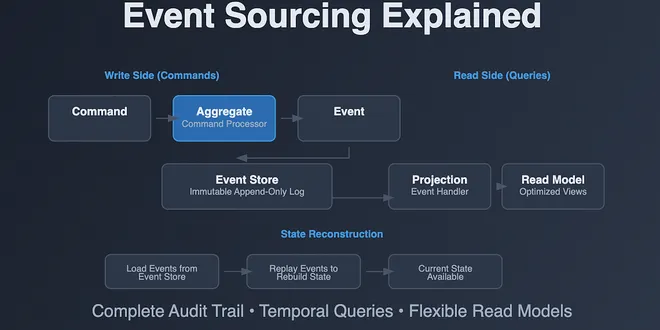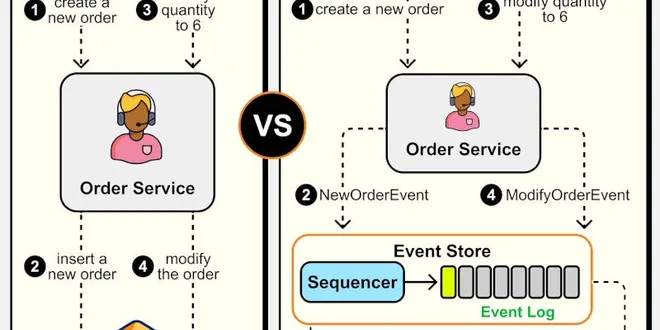Event Sourcing Patterns

Do you really need “Event Sourcing”?
“Event sourcing refers to a collection of patterns based on the idea of persisting the full history of a domain as sequence of events rather than persisting just the current state” — by Udi DahanSpoil...
📚 Read more at Javarevisited🔎 Find similar documents

Pragmatic Event Sourcing
Having successfully built multiple systems using event-sourcing patterns, I have also encountered cases where people have complicated their architecture in the name of event sourcing — an inevitable…
📚 Read more at Better Programming🔎 Find similar documents

Event Sourcing: The new silver bullet?
Event Sourcing is part of a large architectural design called event-driven architecture. Here is what I have learned after research, and… Continue reading on Level Up Coding
📚 Read more at Level Up Coding🔎 Find similar documents

What (and Why) is Event Sourcing?
Event sourcing is a data persistence strategy often mentioned in domain-driven design (DDD) and CQRS. The concepts are independent but complement each other perfectly. But how does event sourcing…
📚 Read more at Level Up Coding🔎 Find similar documents

Event sourcing
As introduced in Chapter 2 , Architectural Styles , event sourcing means that instead of always storing the whole state of your application, possibly dealing with conflicts during updates, you can jus...
📚 Read more at Software Architecture with C plus plus🔎 Find similar documents

Event Sourcing Stores the Wrong Thing (And That’s Why It Works)
The Mental Shift That Makes Event Sourcing Click Event Sourcing confuses developers because they can’t picture how you’d actually build something this way. The concepts make sense, but where’s the sho...
📚 Read more at Level Up Coding🔎 Find similar documents

Implement Event Sourcing With MongoDB
The Event Sourcing approach is an emerging pattern for building new architectures based on microservices. The advantages of this approach are too many to be listed, but I will try to share the most…
📚 Read more at Level Up Coding🔎 Find similar documents

Event Sourcing Explained with code examples in Java
Event sourcing is an architectural pattern that revolves around the idea of treating state changes as a sequence of immutable events. Instead of storing the current state of your data, you store a ful...
📚 Read more at Javarevisited🔎 Find similar documents

Event sourcing
You can think of events as notifications that contain additional data for the notified services to process. There is, however, another way to think of them: a change of state. Think how easy it would ...
📚 Read more at Software Architecture with C plus plus🔎 Find similar documents

EP166: What is Event Sourcing?
The event sourcing paradigm is used to design a system with determinism. This changes the philosophy of normal system designs.
📚 Read more at ByteByteGo Newsletter🔎 Find similar documents

Developer-friendly event sourcing
Event sourcing is about persisting events instead of just the current state. Event sourcing can be helpful for auditing purposes, and to analyze or rebuild previous system states for business analysis...
📚 Read more at Javarevisited🔎 Find similar documents

Stop Overwriting State And Use Event Sourcing Instead
→ Try Flox for free: https://flox.dev/?utm_source=youtube&utm_medium=social&utm_campaign=Arjan&utm_content=homepage In this video, I explore how to build an inventory system using the event sourcing p...
📚 Read more at ArjanCodes🔎 Find similar documents


